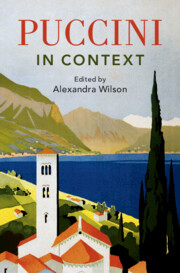Book contents
- Puccini in Context
- Composers in Context
- Puccini in Context
- Copyright page
- Contents
- Figures
- Table
- Notes on Contributors
- Preface
- Part I Formative Influences
- Part II Puccini’s Places
- Part III Influences and Interests
- Part IV Bringing Puccini to the Stage
- Part V Image and Reputation
- Part VI Puccini through a Political Lens
- Chapter 22 Puccini and Religion
- Chapter 23 Puccini and Politics
- Chapter 24 Gender Politics in Puccini’s Operas
- Chapter 25 The Racial Politics ofMadama ButterflyandTurandot
- Part VII Interpreting Puccini
- Part VIII Legacy
- Bibliography
- Index
Chapter 25 - The Racial Politics of Madama Butterfly and Turandot
from Part VI - Puccini through a Political Lens
Published online by Cambridge University Press: 31 August 2023
- Puccini in Context
- Composers in Context
- Puccini in Context
- Copyright page
- Contents
- Figures
- Table
- Notes on Contributors
- Preface
- Part I Formative Influences
- Part II Puccini’s Places
- Part III Influences and Interests
- Part IV Bringing Puccini to the Stage
- Part V Image and Reputation
- Part VI Puccini through a Political Lens
- Chapter 22 Puccini and Religion
- Chapter 23 Puccini and Politics
- Chapter 24 Gender Politics in Puccini’s Operas
- Chapter 25 The Racial Politics ofMadama ButterflyandTurandot
- Part VII Interpreting Puccini
- Part VIII Legacy
- Bibliography
- Index
Summary
This chapter examines the representation of race in Madama Butterfly and Turandot and the controversies that surround the performance of these works today. It shows how casting, design, and other elements in contemporary productions of the two operas become entangled with the fraught racial politics inherent in their scores and librettos. The chapter makes a particular note of the participation of musicians, directors, set designers, costume designers, and critics of Asian descent whose active presence adds an additional layer of complexity to the discussion. Madama Butterfly began to be discussed in Japan soon after its première and by the mid-twentieth century companies were beginning to seek out experts from Japan to lend enhanced cultural credence of their productions. More recent productions, however, have moved away from striving for ‘authenticity’ and begun to re-envision Puccini’s text in radical ways. Productions of Turandot have either staged the opera in authentically Chinese fashion or drawn on the abstract modernist impulses inherent in the work. Chinese audiences have been far less exposed to the work and Chinese artists less involved in its rethinking, at least until the late twentieth century. The advent of social media has broadened the questioning of the ethics of these works.
- Type
- Chapter
- Information
- Puccini in Context , pp. 205 - 214Publisher: Cambridge University PressPrint publication year: 2023



